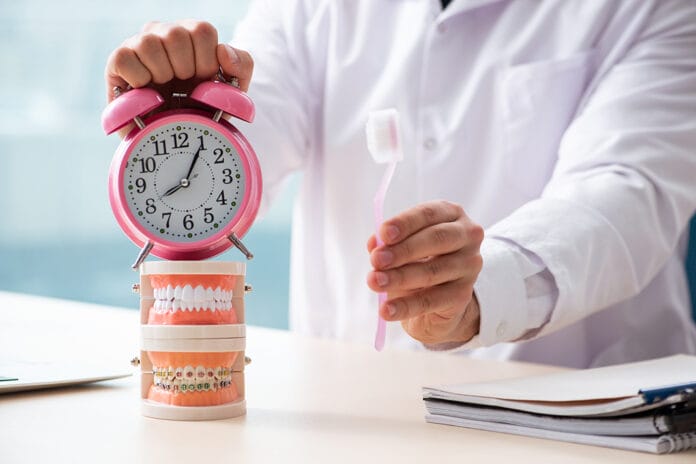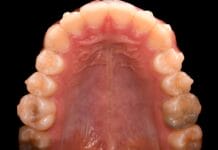If you have worked in a dental hygiene clinical setting, then you know the struggles that come along with efficiently meeting allotted appointment time deadlines. When it comes to treating your patients, providing excellent care ethically and legally, catching up with your patients’ personal lives, and finishing all chart notes within the time you are given, it helps to have some good tools to guide you and hold you accountable.
Unfortunately, time management isn’t a subject that many of us were taught in dental hygiene school. If you’re anything like me, it’s an area in which you can definitely use some help. The ever-shrinking hour can seem daunting at times. How can we combat that?
1) Colleagues Can Assist
Not having enough time is one of the main issues when it comes to time management.1 I have found that it helps to delegate some tasks. I’m the type of person who likes doing things a certain way, but it can be overwhelming going at certain tasks alone. Being flexible and open to others’ assistance gives me a chance to breathe and rely on someone else to ease my workload. For example, on the days when I am double booked with patients, I prefer to have an assistant seat the patient, take necessary radiographs, and polish for me. Dividing up the appointment time alleviates a lot of the stress for me.
I have the luxury in my office to have multiple hygiene operatories that mitigate overflow. This, paired with having hygiene kits/trays prepared ahead of time, gives me the flexibility needed when I need to rely on a coworker to assist me. I know that not every hygienist has this opportunity, so something as simple as asking a team member to wipe down your room while you get set up for your next patient can be a huge help. Remembering to take advantage of the resources available to you makes your day flow much smoother.
2) Multitasking
Something else to consider is multitasking. One study states that we actually work slower and less efficiently when we multitask due to the demands we place on our brains, switching between tasks more frequently rather than working on autopilot.2
I find that to be somewhat subjective. In some instances, yes, but multitasking can be helpful at other times, such as when you are using the ultrasonic in one hand, suctioning with the other, while using the foot pedal to run the instrument, and also double-checking the radiographs for that stubborn piece of calculus. Not to mention while doing all of these things, keeping an eye on the clock, knowing that some extra time is required for the doctor’s exam and making a mental note to have them check that one ‘suspicious spot’ you noticed while scaling.
When I was in dental hygiene school, one of my favorite things to do was patient education. I could easily spend 15 minutes reviewing OHI, such as brushing techniques, cleaning interdentally, and mouth rinse benefits. In most cases, we don’t have that kind of extra time in our day-to-day operations. So going over these instructions simultaneously as you are scaling can save precious time. Then, at the end of hygiene treatment, if you need to do a quick demo, you can easily make the time for that.
I have found that my patients appreciate this as well. Doing this increases the likelihood of them retaining the information instead of feeling like we’re “dumping” everything on them at once.
3) Organization Techniques
Another one of my favorite skills to incorporate into my daily hygiene practice is organization. I worked as a temporary hygienist for almost a year, and I was able to see how many different offices were organized, which gave me an appreciation for a solid sense of order.
I like to begin each day by doing a full audit for the following day, ensuring I know what each patient requires during the appointments and treatment plan accordingly ‒ which patients need radiographs, periodontal probing, fluoride treatment, etc.
I then review the present day’s schedule to ensure I have plenty of supplies and items that are needed for treatment in my operatory to keep the day running efficiently. If any supplies are running low, this is the perfect time to restock rather than grab things as needed.
One of the biggest frustrations and time wasters is when you are in the middle of a procedure and need something only to find it missing or out of stock, such as needing to take an intraoral picture and finding that you’re completely out of protective sleeves. If this sort of thing happens multiple times throughout the day, this adds up quickly and can seriously affect your productivity and put you behind schedule.
Another time-saving and organization technique that is very helpful is printing treatment plans ahead of time before the patient is in your chair. Not only does it keep you from running to the printer all day, but patients appreciate the timeliness, too, especially when they are ready to schedule their appointment or if they are willing to start treatment the same day.
If you find that trying to keep your list of things to do in your head is too overwhelming, it can also help to write things out. Get a daily planner, use your notes app, or just write out a quick to-do list to guide you through the day.
From my experience, sticky notes are a quick, convenient way to jot down small tasks as you go throughout the day. I like this method because it helps me to write things out, and once the task is completed, it is simple to discard the note and continue with the next one. For a less wasteful option, typing up a quick list on your computer can have the same effect.
Being prepared for any circumstance is highly underrated, in my opinion. Having peace of mind going into each and every day helps us be the best clinician for our patients and team member for our work family!
Before you leave, check out the Today’s RDH self-study CE courses. All courses are peer-reviewed and non-sponsored to focus solely on high-quality education. Click here now.
Listen to the Today’s RDH Dental Hygiene Podcast Below:
References
- Indeed Editorial Team. (2023, March 16). 12 Time-Management Problems (and How To Fix Them). Indeed. https://www.indeed.com/career-advice/career-development/time-management-problems
- Moisala, M., Salmela, V., Hietäjarvi, L., et al. Media Multitasking is Associated with Distractibility and Increased Prefrontal Activity in Adolescents and Young Adults. NeuroImage. 2016; 134: 113-121. https://www.sciencedirect.com/science/article/abs/pii/S1053811916300441












